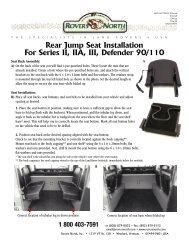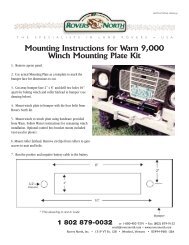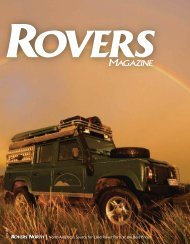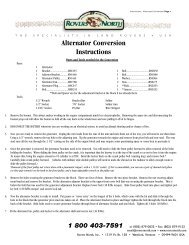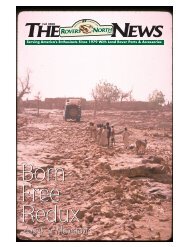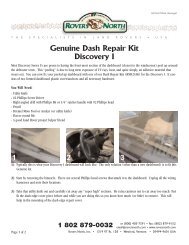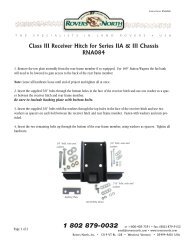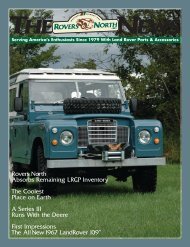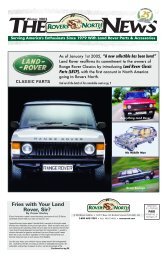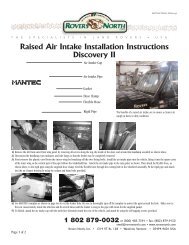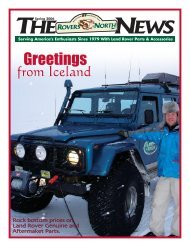Create successful ePaper yourself
Turn your PDF publications into a flip-book with our unique Google optimized e-Paper software.
ecome buried in snow; even our <strong>Rover</strong>s withchains and air lockers could not make itthrough the snow on the way to the GoldenRoad, so we had to head back for Greenvilleand attempt to use the western approacharound Moosehead Lake to points north. Onour return toward Greenville one of the locals, ayearling moose, decided that he preferred thecleared road to trudging through deep snow. Ittook him a few minutes, and a lunge at theDefender’s wing, to let us pass.Once we returned to Greenville we headedwest on a glare ice road to Jackman and thennorth to pick up the Golden Road. The extradriving meant that we had fallen behind schedule;the Golden Road was not even the halfwaypoint for this leg of the trek. We had to push oninto the evening and make it to Eagle Lake. Wehad to have a full day for the trip in and out ofEagle Lake, and if we couldn’t make camp nearEagle Lake, we wouldn’t have enough daylight tosafely make the hike in to find the trains. Westopped to check our distances, confirm ourETA, and plan for increased speed. So we drovehard to recover the time lost on the failedattempt up the east side of Moosehead Lake; the“spirited” ice driving tested our winter drivingskills at the limits of our vehicles. Geoff Cox calculatedthat we would arrive well after dark,and he proved right. We did manage to setcamp effectively by our vehicles’ lights.Winter camping isn’t as bad as you think.You quickly get used to it and with the rightequipment it can be a great experience. Geoffand Jason set up the tent while Ian and I gatheredfirewood. The peacefulness of the Mainewoods in the middle of winter is a wonderfulexperience. While winter camping means youdon’t have to worry about the bugs, coyotes areanother story; in themorning we foundevidence - in theform of a partiallyeaten moose carcass- that coyoteshad dined on a littletoo close toour campsite forcomfort.That nextmorning wepacked up campand headedtowards EagleLake. <strong>Rover</strong>s canhandle a lot offroad, but thefields approachingEagle Lakehad over threefeet of snow. No matter howmuch you equip your <strong>Rover</strong>, once they sink in 3feet of snow you are probably walking home.We attacked the snow for as far as we couldwith the <strong>Rover</strong>s, put on our snowshoes, andbegan our hike to the lake.According to the GPS we faced a 4.5 milewalk. Compounding our problem was theunusually warm weather. Around 10 am the sunbroke through the clouds. As the snow compactedeach step brought with it a clump ofheavy, wet snow. The snow conditions variedA photograph of our capable Land <strong>Rover</strong>s, taken on Golden Roaddepending on whether it lay on open land orcovered by trees. At different times, we all foundplaces on the trail where the snow gave wayAs we approached the shore of the lake, we spotted this oldsteam boiler. It lay alongside the old track, perhaps used as aswitcher of some type of stationary power unit.beneath us and sucked us like quicksand. Wewere thankful for our walking poles and theyproved invaluable in assisting you on everysinking.As we approached the shore of the lake, wespotted this old steam boiler. It lay alongside theold track, perhaps used as a switcher of sometype of stationary power unit.One of the most haunting feelings I will everexperience is driving and hiking this deep intothe woods of Maine and finding two antiquesteam locomotives left in the woodsover 70 years ago.Looking like it was still ready to go, one of theengines still pointed directly down the imaginarytrack and, with the front cover off the boiler, theominous black eye of this engine watched as wewalked towards it.The two engines sat side by side in a smallclearing in what used to be a repair shed; withfire damage on both engines, we guessed thatthe shed had been burned 70 years ago. Afterthe long hike we took a break near the trains;Geoff can’tresist gettingbehind thecontrols andplaying “engineer”with hishead out thewindow ofEngine One.Our thoughtsturn to restorationsanddreams ofmaking theengines liveagain, but aftera few minutestalk we realizewhy theengines wereleft here in1930 and wesit back to just enjoy them before we have tostart back out before dusk.As we headed out along the bank of thefrozen lake we came across a spur line from therailroad and found the remains of thetimber cars fromthe operation.Their wooden cars have long since rottedoff, but the axles and framework still lie onthe tracks. The hike back was long andtook a lot out of us, but finding the trainswas well worth the effort. We were treat -Heading home...Eagle Lake to the left, and one of the frozen intime engines above.ed to a wonderful sunset on the drive out, butthe unusually warm day had led to portions ofthe frost being unfrozen in the road. The roadwould suddenly turn to deep mud under ourwheels and create ruts that yielded instant lanechanges and fishtails.After battling through the ruts and mud toGreenville, where the tarmac begins again, wefound that the entire area was without powerand the one gas station in Greenville was closeddue to no power at the pumps. Fortunately wehad reserves with us in case of the worst on ourtrek in the woods, so we could continue southward.A few minutes outside of Greenville thewarm night had combined with the cool snowcovered ground to produce a dense blanket offog that limited our speeds to roughly 25 mphfor the return trip to East Coast <strong>Rover</strong>, buteveryone made it home safely. That night I thinkwe all dreamed of playing with trains again likewhen we were kids; the only difference is thatthe trains we like to think about now are thetwo that sit as hidden 90 ton reminders of anabandon railroad tucked away deep inNorthern Maine.© 2001 <strong>Rover</strong>s North Inc • 1319 VT Route 128, Westford, Vermont 05494-9601, USA • 802.879.0032 • e-mail rovers@together.net • www. r o v e r s n o r t h . c o m



